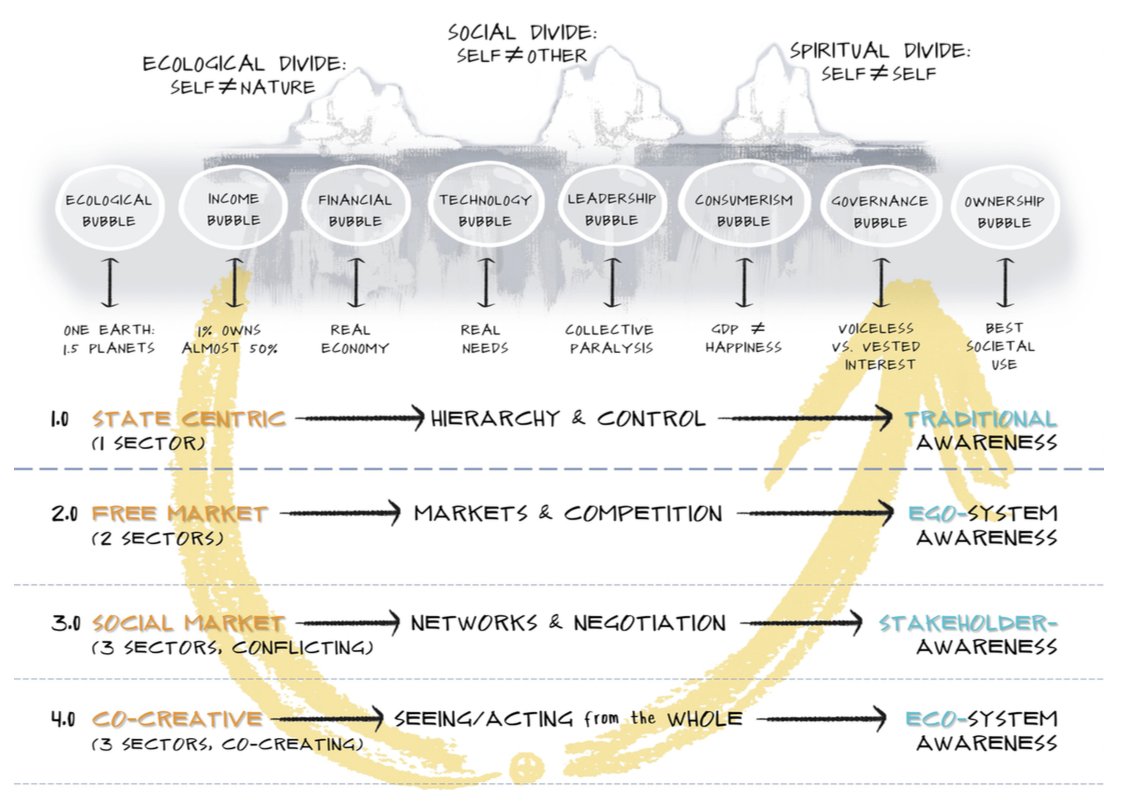Management texts do a brilliant job of categorising and detailing management thinkers – the people that have shepherded or at least recorded the impressive rise of industrialisation in the 20th Century. Industrialisation generated unprecedented material advances for us. The down side is the impact on the environment and the ossification of management practice. I haveContinue reading “Redefining management for the 21st Century”
Category Archives: leadership
Teacher or midwife?
“One of the only places operating largely as it did more than 50 years ago would be the local school.”[1] That was written in the early days of the Internet, and the pace of change is accelerating – is education keeping up? Otto Scharmer’s book Leading From the Emerging Future: From Ego-systems to Eco-Systems enableContinue reading “Teacher or midwife?”
If we want a better world, we need to be heard
As I write this, we are still in the grips of a severe storm. I can’t recall experiencing such winds – strong enough to break concrete power poles! Of course one weather event is not proof of climate change, but the evidence is lining up. The severe winds that have created damage in Northland (fromContinue reading “If we want a better world, we need to be heard”
Do you get the potential of local currencies?
Money is like blood for the body economic. It has to keep circulating for local economies to prosper. But what if that economic lifeblood is being drained away by national or international businesses? I spent Monday and Tuesday this week at an inspirational conference hosted by the Far North District Council (FNDC) – the governingContinue reading “Do you get the potential of local currencies?”
All Blacks culture drives their success
The All Blacks are arguably the most successful International sports team. This year they won all 14 games against the top teams in the world. The All Blacks culture is the foundation for their success. I teach organisational culture, so I know the theory well and I am always looking for strong examples. They areContinue reading “All Blacks culture drives their success”
Waiting for the communication revolution
Over the last few decades communication channels have multiplied and in some organisations, communications have improved, but for the vast majority, workplace communication is still a major impediment to both organisational effectiveness and individual well-being. What are the solutions? How will the breakthroughs come? The foundations have been laid. The Internet has been with us for almost 25 years.Continue reading “Waiting for the communication revolution”
Daniel Pink on the need for a rethink
Daniel Pink claims that management is an outdated technology. He stresses the importance of engagement and self-direction. Check the other excellent resources at the Let Go and Lead website.
A policeman’s lot is more engaged – national | Stuff.co.nz
A policeman’s lot is more engaged – national | Stuff.co.nz. Improvements in staff engagement in the Police can partially be attributed to technology innovations. The New Zealand Police have introduced technology that enables police to report incidents remotely. That information is then processed by administrative staff enabling the police to focus on their front-line work.Continue reading “A policeman’s lot is more engaged – national | Stuff.co.nz”
A tribute to Stephen Covey (1932 – 2012)
Stephen Covey made an enduring contribution to both business thinking and personal development. His book The 7 Habits of Highly Effective People published in 1989 has sold over 25 million copies. Time Magazine rated The 7 Habits as one of the 25 most influential business management books. He has featured in all of the ThinkersContinue reading “A tribute to Stephen Covey (1932 – 2012)”
Narcissism: The Difference Between High Achievers and Leaders – Justin Menkes – Harvard Business Review
This HBR post from Justin Menkes is another contribution to the ever-growing body of evidence that effective leaders are good people that care for others. As Justin Menkes states: Only an individual who feels genuinely invigorated by the growth, development, and success of others can become an effective leader of an enterprise. When reading thisContinue reading “Narcissism: The Difference Between High Achievers and Leaders – Justin Menkes – Harvard Business Review”


